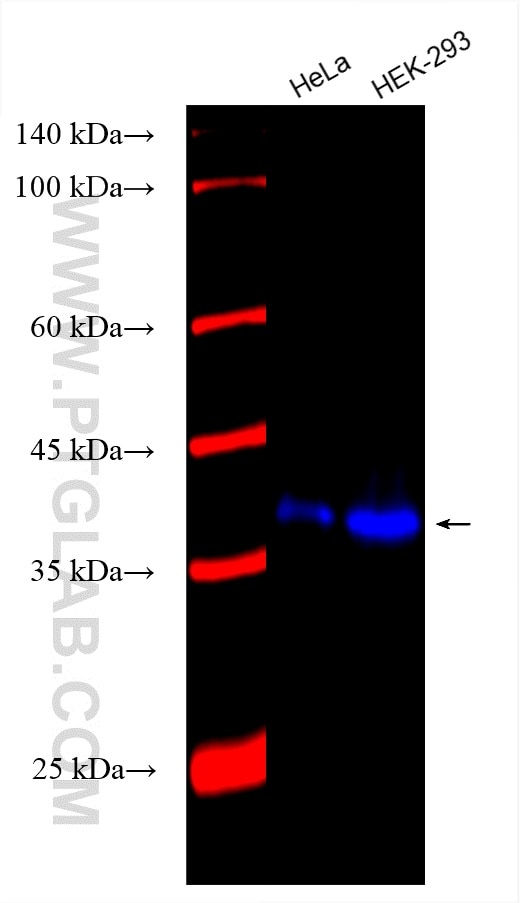Validation Data Gallery
Tested Applications
| Positive WB detected in | HeLa cells, HEK-293 cells |
Recommended dilution
| Application | Dilution |
|---|---|
| Western Blot (WB) | WB : 1:1000-1:4000 |
| It is recommended that this reagent should be titrated in each testing system to obtain optimal results. | |
| Sample-dependent, Check data in validation data gallery. | |
Product Information
CL750-66552 targets XLF in WB applications and shows reactivity with Human samples.
| Tested Reactivity | Human |
| Host / Isotype | Mouse / IgG2b |
| Class | Monoclonal |
| Type | Antibody |
| Immunogen | XLF fusion protein Ag2496 相同性解析による交差性が予測される生物種 |
| Full Name | nonhomologous end-joining factor 1 |
| Calculated molecular weight | 35 kDa |
| Observed molecular weight | 37 kDa |
| GenBank accession number | BC030986 |
| Gene Symbol | XLF |
| Gene ID (NCBI) | 79840 |
| RRID | AB_3084894 |
| Conjugate | CoraLite® Plus 750 Fluorescent Dye |
| Excitation/Emission maxima wavelengths | 755 nm / 780 nm |
| Form | Liquid |
| Purification Method | Protein A purification |
| UNIPROT ID | Q9H9Q4 |
| Storage Buffer | PBS with 50% glycerol, 0.05% Proclin300, 0.5% BSA{{ptg:BufferTemp}}7.3 |
| Storage Conditions | Store at -20°C. Avoid exposure to light. Stable for one year after shipment. Aliquoting is unnecessary for -20oC storage. |
Background Information
XRCC4-like factor (XLF), also known as Cernunnos and NHEJ1, is a protein encoded by the human NHEJ1 gene and an important repair factor for DNA double-strand breaks. NHEJ is a well-known mechanism for the repair of double-strand breaks (DSBs), a lethal type of DNA damage in mammalian cells. It basically utilizes a group of enzymes to take hold of the ends of a broken DNA molecule, create a bridge between them, and subsequently re-ligate the broken DNA molecule.
Protocols
| Product Specific Protocols | |
|---|---|
| WB protocol for CL Plus 750 XLF antibody CL750-66552 | Download protocol |
| Standard Protocols | |
|---|---|
| Click here to view our Standard Protocols |
